Bhagavad Gita quotes with meaning in Hindi and English

What is Bhagavad Gita (भगवद् गीता।)?
Bhagavad Gita was told by Lord Krishna to Arjuna as an advise of what’s right and wrong when Arjuna was hesitant to go to war against his own cousins, the Kauravas. The events that led to this war are described in the Mahabharata, a 200 thousand verses long epic by sage Vyasa. Bhagavad Gita is a 700 verse epic divided into 18 chapters.
Bhagavad Gita talks about various paths to spirituality such as the right action (Karma Yoga), devotion (Bhakti Yoga), and knowledge (Jnana Yoga).
Bhagavad Gita Jayanti quote 2025

गीता मे चोत्तमं गृहम्॥
Transliteration:
gītā me cottamaṃ gṛham॥
Hindi Translation:
भगवान विष्णु कहते हैं - गीता मेरा परम धाम
है।
English Translation:
Bhagawan Vishnu says - The Geeta is my
greatest abode
Source:
गीतामहात्म्यम्-वराहपुराण ७
Bhagavad Gita Jayanti quote 2024

सर्वोपनिषदो गावो दोग्धा गोपालनन्दनः।
पार्थो वत्सः सुधीर्भोक्ता दुग्धं गीतामृतं महत्॥
Transliteration:
sarvopaniṣado gāvo dogdhā
gopālanandanaḥ।
pārtho vatsaḥ sudhīrbhoktā dugdhaṃ gītāmṛtaṃ mahat॥
Hindi Translation:
सभी उपनिषद् गाय हैं, भगवान कृष्ण ग्वाले
हैं,
अर्जुन बुद्धिमान बछड़ा हैं और भगवद्गीता का अमृत महान दूध है।
English Translation:
All the Upanishads are cows, Lord
Krishna is the Cowherd,
Arjuna is the wise Calf and the nectar of the Bhagavadgītā is the greatest Milk.
Source:
गीतामहात्म्यम् ६
Bhagavad Gita Jayanti quote 2023

जातस्य हि ध्रुवो मृत्युर्ध्रुवं जन्म मृतस्य च।
तस्मादपरिहार्येऽर्थे न त्वं
शोचितुमर्हसि॥ २-२७
Transliteration:
jātasya hi dhruvo mṛtyurdhruvaṃ janma
mṛtasya ca।
tasmādaparihārye’rthe na tvaṃ śocitumarhasi॥ 2-27
Hindi Translation:
जन्मने वाले की मृत्यु निश्चित है और मरने
वाले का जन्म निश्चित है इसलिए जो अटल है अपरिहार्य है उसके विषय में तुमको शोक नहीं करना चाहिये।
English Translation:
Death is certain for the born, and
re-birth is certain for the dead; therefore you should not feel grief for what is inevitable.
Bhagavad Gita Jayanti quote


प्रारब्धं भुज्यमानो हि गीताभ्यासरतः सदा।
स मुक्तः
स सुखी लोके कर्मणा नोपलिप्यते॥
Transliteration:
śrīviṣṇuruvāca
prārabdhaṃ bhujyamāno hi gītābhyāsarataḥ sadā।
sa muktaḥ sa sukhī loke karmaṇā nopalipyate॥
Hindi Translation:
प्रारब्ध-कर्म को भोगता हुआ जो मनुष्य गीता
के अभ्यास में निरत है,
वह इस लोक में मुक्त और सुखी होता है तथा कर्म में लिप्त नहीं होता।
English Translation:
One who indulges in ongoing
action and is engaged in regular study of the gītā,
is free and happy in this world and is not bound by
karma.
Source:
गीता-माहात्म्यम् २ (gītā-māhātmyam 2)
Chapter 2 – Sānkhya Yog : The Yog of Analytical Knowledge
Chapter 2, verse 13
देहिनोऽस्मिन्यथा देहे कौमारं यौवनं
जरा।
तथा देहान्तरप्राप्तिर्धीरस्तत्र न मुह्यति॥ २-१३
Transliteration:
dehino’sminyathā
dehe kaumāraṃ yauvanaṃ jarā।
tathā dehāntaraprāptirdhīrastatra na muhyati॥ 2-13
Hindi Translation:
जैसे इस देह में देही जीवात्मा की कुमार,
युवा और वृद्धावस्था होती है
वैसे ही उसको अन्य शरीर की प्राप्ति होती है। धीर पुरुष इसमें मोहित नहीं होता
है।
English Translation:
Just as the
boyhood, youth and old age come to the embodied Soul in this body, in the same manner, is the attaining of
another body; the wise man is not deluded at that.
Chapter 2, verse 19
य एनं वेत्ति हन्तारं यश्चैनं मन्यते हतम्।
उभौ तौ न
विजानीतो नायं हन्ति न हन्यते॥ २-१९
Transliteration:
ya enaṃ vetti
hantāraṃ yaścainaṃ manyate hatam।
ubhau tau na vijānīto nāyaṃ hanti na hanyate॥ 2-19
Hindi Translation:
जो आत्मा को
मारने वाला समझता है और जो इसको मरा समझता है वे दोनों ही नहीं जानते हैं,
क्योंकि यह आत्मा न मरता है और न मारा
जाता है।
English Translation:
He who
thinks that the soul kills, and he who thinks of it as killed, are both ignorant. The soul kills not, nor is it
killed.
Chapter 2, verse 20

न जायते म्रियते वा कदाचिन्
नायं भूत्वा भविता वा न भूयः।
अजो नित्यः शाश्वतोऽयं पुराणो
न हन्यते
हन्यमाने शरीरे॥ २-२०
Transliteration:
na jāyate
mriyate vā kadācin
nāyaṃ bhūtvā bhavitā vā na bhūyaḥ।
ajo nityaḥ śāśvato’yaṃ purāṇo
na hanyate
hanyamāne śarīre॥ 2-20
Hindi Translation
आत्मा किसी काल
में भी न जन्मता है और न मरता है और न यह एक बार होकर फिर अभावरूप होने वाला है।
आत्मा अजन्मा, नित्य, शाश्वत और
पुरातन है, शरीर के नाश होने पर भी इसका नाश नहीं होता।
English Translation:
The soul is
never born, it never dies having come into being once, it never ceases to be.
Unborn, eternal, abiding and
primeval, it is not slain when the body is slain.
Chapter 2, verse 22
वासांसि जीर्णानि यथा विहाय
नवानि गृह्णाति नरोऽपराणि।
तथा शरीराणि
विहाय जीर्णा-
न्यन्यानि संयाति नवानि देही॥ २-२२
Transliteration:
vāsāṃsi jīrṇāni yathā vihāya
navāni gṛhṇāti
naro’parāṇi।
tathā śarīrāṇi vihāya jīrṇā-
nyanyāni saṃyāti navāni dehī॥ 2-22
Hindi Translation:
जैसे मनुष्य
जीर्ण वस्त्रों को त्यागकर दूसरे नये वस्त्रों को धारण करता है
वैसे ही देही जीवात्मा पुराने शरीरों को त्याग कर
दूसरे नए शरीरों को प्राप्त होता है।
English Translation:
As a man
casts off worn-out garments and puts on others that are new,
so does the soul cast off its worn-out bodies
and enter into others that are new.
Chapter 2, verse 23


नैनं छिन्दन्ति शस्त्राणि नैनं दहति पावकः।
न चैनं क्लेदयन्त्यापो न शोषयति मारुतः॥
२-२३
nainaṃ chindanti śastrāṇi nainaṃ dahati pāvakaḥ।
na cainaṃ kledayantyāpo na śoṣayati mārutaḥ॥ 2-23
आत्मा को शस्त्र काट नहीं सकते और न अग्नि इसे जला सकती है जल इसे गीला नहीं कर सकता और वायु इसे सुखा नहीं सकती।
Weapons do not cleave the soul, fire does not burn it, waters do not wet it, and wind does not dry it.
Chapter 2, verse 27

जातस्य हि ध्रुवो मृत्युर्ध्रुवं जन्म मृतस्य च।
तस्मादपरिहार्येऽर्थे न त्वं
शोचितुमर्हसि॥ २-२७
Transliteration:
jātasya hi dhruvo mṛtyurdhruvaṃ janma
mṛtasya ca।
tasmādaparihārye’rthe na tvaṃ śocitumarhasi॥ 2-27
Hindi Translation:
जन्मने वाले की मृत्यु निश्चित है और
मरने वाले का जन्म निश्चित है इसलिए जो अटल है अपरिहार्य है उसके विषय में तुमको शोक नहीं करना चाहिये।
English Translation:
Death is certain for the born, and
re-birth is certain for the dead; therefore you should not feel grief for what is inevitable.

Bhagavad Gita Quotes on Your Wall!
Buy ReSanskrit Merchandise...
See
More!
Chapter 2, verse 37

हतो वा प्राप्स्यसि स्वर्गं जित्वा वा भोक्ष्यसे महीम्।
तस्मादुत्तिष्ठ कौन्तेय युद्धाय
कृतनिश्चयः॥ २-३७
Transliteration:
hato vā prāpsyasi svargaṃ jitvā vā bhokṣyase
mahīm।
tasmāduttiṣṭha kaunteya yuddhāya kṛtaniścayaḥ॥ 2.37
Hindi Translation:
या तो तू युद्ध में मारा जाकर स्वर्ग को
प्राप्त होगा अथवा संग्राम में जीतकर पृथ्वी का राज्य भोगेगा।
इस कारण के अर्जुन! तू युद्ध के लिए निश्चय करके
खड़ा हो जा।
English Translation:
Die, and you will win heaven; conquer,
and you will enjoy sovereignty of the earth;
therefore, stand up Arjuna, determined to fight.
Chapter 2, verse 38

सुखदुःखे समे कृत्वा लाभालाभौ जयाजयौ।
ततो युद्धाय युज्यस्व नैवं पापमवाप्स्यसि॥
२-३८
Transliteration:
sukhaduḥkhe same kṛtvā lābhālābhau
jayājayau।
tato yuddhāya yujyasva naivaṃ pāpamavāpsyasi॥ 2-38
Hindi Translation:
सुखदुख, लाभहानि और जयपराजय को समान करके
युद्ध के लिये तैयार हो जाओ इस प्रकार तुमको पाप नहीं होगा।
English Translation:
Holding pleasure and pain, gain and
loss, victory and defeat as alike, gird yourself up for the battle.
Thus, you shall not incur any sin.
Chapter 2, verse 47
कर्मण्येवाधिकारस्ते मा फलेषु कदाचन।
मा कर्मफलहेतुर्भूर्मा ते सङ्गोऽस्त्वकर्मणि॥ २-४७
Transliteration:
karmaṇyevādhikāraste mā phaleṣu
kadācana।
mā karmaphalaheturbhūrmā te saṅgo’stvakarmaṇi॥ 2-47
Hindi Translation:
कर्म करने मात्र में तुम्हारा अधिकार है, फल
में कभी नहीं। तुम कर्मफल के हेतु वाले मत होना और अकर्म में भी तुम्हारी आसक्ति न हो।
English Translation:
To work alone you have the right, and
not to the fruits. Do not be impelled by the fruits of work.
Nor have attachment to inaction.
Chapter 2, verse 48
योगस्थः कुरु कर्माणि सङ्गं त्यक्त्वा धनञ्जय।
सिद्ध्यसिद्ध्योः समो भूत्वा समत्वं योग उच्यते॥
२-४८
Transliteration:
yogasthaḥ kuru karmāṇi saṅgaṃ tyaktvā
dhanañjaya।
siddhyasiddhyoḥ samo bhūtvā samatvaṃ yoga ucyate॥ 2-48
Hindi Translation:
हे धनंजय आसक्ति को त्याग कर तथा सिद्धि और
असिद्धि में समभाव होकर
योग में स्थित हुये तुम कर्म करो। यह समभाव ही योग कहलाता है।
English Translation:
By being established in Yoga, O
Dhananjaya, undertake actions, casting off attachment
and remaining equipoised in success and failure.
Equanimity is called Yoga.
Chapter 2, verse 50

बुद्धियुक्तो जहातीह उभे सुकृतदुष्कृते।
तस्माद्योगाय युज्यस्व योगः कर्मसु कौशलम्॥
२-५०
Transliteration:
buddhiyukto jahātīha ubhe
sukṛtaduṣkṛte।
tasmādyogāya yujyasva yogaḥ karmasu kauśalam॥ 2-50
Hindi Translation:
समबुद्धि युक्त पुरुष पुण्य और पाप दोनों को
इसी लोक में त्याग देता है, अर्थात उनसे मुक्त हो जाता है।
इससे तू समत्वरूप योग में लग जा; यह समत्व रूप योग ही
कर्मों में कुशलता है अर्थात कर्मबन्धन से छूटने का उपाय है।
English Translation:
Endowed with equanimity, one sheds in
this life both good and evil.
Therefore, strive for the practice of this Yoga of equanimity. Skill in action
lies (in the practice of) this Yoga.
Chapter 2, verse 51
कर्मजं बुद्धियुक्ता हि फलं त्यक्त्वा मनीषिणः।
जन्मबन्धविनिर्मुक्ताः पदं गच्छन्त्यनामयम्॥
२-५१
Transliteration:
karmajaṃ buddhiyuktā hi phalaṃ tyaktvā
manīṣiṇaḥ।
janmabandhavinirmuktāḥ padaṃ gacchantyanāmayam॥ 2-51
HIndi Translation:
बुद्धियोग युक्त मनीषी लोग कर्मजन्य फलों को
त्यागकर जन्मरूप बन्धन से मुक्त हुये अनामय अर्थात निर्दोष पद को प्राप्त होते हैं।
English Translation:
The wise, possessed of knowledge, having
abandoned the fruits of their actions,
and being freed from the fetters of birth, go to the place which is
beyond all evil.
Chapter 2, verse 58
यदा संहरते चायं कूर्मोऽङ्गानीव सर्वशः।
इन्द्रियाणीन्द्रियार्थेभ्यस्तस्य प्रज्ञा
प्रतिष्ठिता॥ २-५८
Transliteration:
yadā saṃharate cāyaṃ kūrmo'ṅgānīva
sarvaśaḥ।
indriyāṇīndriyārthebhyastasya prajñā pratiṣṭhitā॥ 2-58
Hindi Translation:
कछुवा अपने अंगों को जैसे समेट लेता है
वैसे ही यह पुरुष जब सब ओर से अपनी इन्द्रियों को इन्द्रियों के विषयों से परावृत्त कर लेता है, तब उसकी बुद्धि
स्थिर होती है।
English Translation:
One who is able to withdraw the senses
from their objects,
just as a tortoise withdraws its limbs into its shell, is established in divine wisdom.
Chapter 2, verse 60

यततो ह्यपि कौन्तेय पुरुषस्य विपश्चित:।
इन्द्रियाणि प्रमाथीनि हरन्ति प्रसभं मन:॥ २-६०
Transliteration:
yatato hyapi kaunteya puruṣasya
vipaścita:।
indriyāṇi pramāthīni haranti prasabhaṃ mana:॥ 2-60
Hindi Translation:
हे अर्जुन! ये इन्द्रियाँ इतनी प्रबल और
वेगवान हैं कि ये विवेकशील मनुष्य के
मन को भी बलपूर्वक हर लेती हैं, जो इन्हें वश में करने का प्रयत्न करता है।
English Translation:
The senses are so strong and turbulent,
O son of Kunti, that they can forcibly
carry away the mind even of a person endowed with discrimination who practices self-control.
Chapter 2, verse 62

ध्यायतो विषयान्पुंस: सङ्गस्तेषूपजायते।
सङ्गात्सञ्जायते काम: कामात्क्रोधोऽभिजायते॥
२-६२
Transliteration:
dhyāyato viṣayānpuṃsa:
saṅgasteṣūpajāyate।
saṅgātsañjāyate kāma: kāmātkrodho'bhijāyate॥ 2-62
Hindi Translation:
इन्द्रियों के विषयों का चिंतन करते हुए
मनुष्य उनमें आसक्त हो जाता है और
आसक्ति कामना की ओर ले जाती है और कामना से क्रोध उत्पन्न होता है।
English Translation:
While contemplating on the objects of
the senses, one develops attachment to them.
Attachment leads to desire, and from desire arises anger.
Chapter 2, verse 63

क्रोधाद्भवति सम्मोहः सम्मोहात्स्मृतिविभ्रमः।
स्मृतिभ्रंशाद् बुद्धिनाशो
बुद्धिनाशात्प्रणश्यति॥ २-६३
Transliteration:
krodhādbhavati sammohaḥ
sammohātsmṛtivibhramaḥ।
smṛtibhraṃśād buddhināśo buddhināśātpraṇaśyati॥ 2-63
Hindi Translation:
क्रोध से उत्पन्न होता है मोह और मोह से
स्मृति विभ्रम। स्मृति के भ्रमित होने पर बुद्धि का नाश होता है
और बुद्धि के नाश होने से वह मनुष्य नष्ट हो जाता
है।
English Translation:
From anger there comes delusion; from
delusion, the loss of memory; from the loss of memory,
the destruction of discrimination; and with the
destruction of discrimination, he is lost.
Chapter 2, verse 66
नास्ति बुद्धिरयुक्तस्य न चायुक्तस्य भावना।
न चाभावयतः शान्तिरशान्तस्य कुतः सुखम्॥ २-६६
Transliteration:
nāsti buddhirayuktasya na cāyuktasya
bhāvanā।
na cābhāvayataḥ śāntiraśāntasya kutaḥ sukham॥ 2-66
Hindi Translation:
संयमरहित अयुक्त पुरुष को आत्म ज्ञान नहीं
होता और अयुक्त को भावना और ध्यान की क्षमता नहीं होती।
भावना रहित पुरुष को शान्ति नहीं मिलती अशान्त पुरुष को
सुख कहाँ ?
English Translation:
For the unsteady there is no wisdom, and
there is no meditation for the unsteady man.
And for an un-meditated man, there is no peace. How can there be
happiness for one without peace?
Chapter 2, verse 69
या निशा सर्वभूतानां तस्यां जागर्ति संयमी।
यस्यां जाग्रति भूतानि सा निशा पश्यतो मुनेः॥ २-६९
Transliteration:
yā niśā sarvabhūtānāṃ tasyāṃ jāgarti
saṃyamī।
yasyāṃ jāgrati bhūtāni sā niśā paśyato muneḥ॥ 2.69
Hindi Translation:
संपूर्ण प्राणियोंके लिए जो रात्रि के सामान
है,
उस नित्य ज्ञानस्वरूप परमानंद ली प्राप्ति में स्थितप्रज्ञ योगी जागता है और जिस नाशवान सांसारिक सुख की
प्राप्ति में सब प्राणी जागते हैं,
परमात्मा के तत्त्व को जाननेवाले मुनि के लिए वह रात्रि के सामान है ।
English Translation:
That which is night to all beings, in
that state (of divine knowledge and supreme bliss) the God-realized Yogi keeps awake.
And that (the
ever-changing,
transient worldly happiness) in which all beings keep awake is night to the seer.
Chapter 2, verse 70
आपूर्यमाणमचलप्रतिष्ठं समुद्रमापः प्रविशन्ति यद्वत्।
तद्वत्कामा यं प्रविशन्ति सर्वे स शान्तिमाप्नोति
न कामकामी॥ २-७०
Transliteration:
āpūryamāṇamacalapratiṣṭhaṃ samudramāpaḥ
praviśanti yadvat।
tadvatkāmā yaṃ praviśanti sarve sa śāntimāpnoti na kāmakāmī॥ 2-70
Hindi Translation:
जैसे सम्पूर्ण नदियोंका जल चारों ओरसे
जलद्वारा परिपूर्ण समुद्रमें आकर मिलता है पर समुद्र अपनी मर्यादामें अचल प्रतिष्ठित रहता है।
ऐसे ही सम्पूर्ण
भोगपदार्थ जिस संयमी मनुष्यमें विकार उत्पन्न किये बिना ही उसको प्राप्त होते हैं वही मनुष्य परमशान्तिको प्राप्त
होता है भोगोंकी कामनावाला नहीं।
English Translation:
Just as the ocean remains undisturbed by
the incessant flow of waters from rivers merging into it,
likewise the sage who is unmoved despite the flow
of desirable objects all around him attains peace, and not the person who strives to satisfy desires.
Chapter 2, verse 71
विहाय कामान्यः सर्वान्पुमांश्चरति निःस्पृहः।
निर्ममो निरहङ्कारः स शान्तिमधिगच्छति॥ २-७१
Transliteration:
vihāya kāmānyaḥ sarvānpumāṃścarati
niḥspṛhaḥ।
nirmamo nirahaṅkāraḥ sa śāntimadhigacchati॥ 2-71
Hindi Translation:
जो पुरुष सब कामनाओं को त्यागकर स्पृहारहित,
ममभाव रहित और निरहंकार हुआ विचरण करता है, वह शान्ति प्राप्त करता है।
English Translation:
That man attains peace who, abandoning
all desires, moves about without longing,
without the sense of mine and without egoism.
Chapter 3 – Karma Yog : The Yog of Action
Chapter 3, verse 4
न कर्मणामनारम्भान्नैष्कर्म्यं पुरुषोऽश्नुते।
न च संन्यसनादेव सिद्धिं समधिगच्छति॥ ३-४
Transliteration:
na karmaṇāmanārambhānnaiṣkarmyaṃ
puruṣo’śnute।
na ca saṃnyasanādeva siddhiṃ samadhigacchati॥ 3-4
Hindi Translation:
कर्मों के न करने से मनुष्य नैर्ष्कम्य को
प्राप्त नहीं होता और न कर्मों के संन्यास से ही वह पूर्णत्व प्राप्त करता है।
English Translation:
No man can attain freedom from activity
by refraining from action; nor can he reach perfection by merely refusing to act.
Chapter 3, verse 6
कर्मेन्द्रियाणि संयम्य य आस्ते मनसा स्मरन्।
इन्द्रियार्थन्विमूढात्मा मिथ्याचारः स उच्यते॥ ३-६
Transliteration:
karmendriyāṇi saṃyamya ya āste manasā
smaran।
indriyārthanvimūḍhātmā mithyācāraḥ sa ucyate॥ 3.6
Hindi Translation:
जो मूढबुद्धि मनुष्य समस्त इन्द्रियों को
हठपूर्वक ऊपर से रोककर मन से उन इन्द्रयों के विषयों का चिंतन करता रहता है,
वह मिथ्याचारी अर्थात दम्भी कहा
जाता है।
English Translation:
One, who after withdrawing the organs of
action, sits mentally recollecting the objects of the senses,
that one, of deluded mind, is called a
hypocrite.
Chapter 3, verse 8
नियतं कुरु कर्म त्वं कर्म ज्यायो ह्यकर्मणः।
शरीरयात्रापि च ते न प्रसिद्ध्येदकर्मणः॥ ३-८
Transliteration:
niyataṃ kuru karma tvaṃ karma jyāyo
hyakarmaṇaḥ।
śarīrayātrāpi ca te na prasiddhyedakarmaṇaḥ॥ 3-8
Hindi Translation:
तुम अपने नियत कर्तव्य कर्म करो क्योंकि
अकर्म से श्रेष्ठ कर्म है। तुम्हाम्हारे अकर्म होने से तुम्हारा शरीर निर्वाह भी नहीं सिद्ध होगा।
English Translation:
Therefore, do you perform your allotted
duty; for action is superior to inaction. Desisting from action, you cannot even maintain your body.
Chapter 3, verse 9
यज्ञार्थात्कर्मणोऽन्यत्र लोकोऽयं कर्मबन्धनः।
तदर्थं कर्म कौन्तेय मुक्तसङ्गः समाचर॥ ३-९
Transliteration:
yajñārthātkarmaṇo’nyatra loko’yaṃ
karmabandhanaḥ।
tadarthaṃ karma kaunteya muktasaṅgaḥ samācara॥ 3-9
Hindi Translation:
यज्ञ के लिये किये हुए कर्म के अतिरिक्त
अन्य कर्म में प्रवृत्त हुआ यह पुरुष कर्मों द्वारा बंधता है इसलिए
हे कौन्तेय आसक्ति को त्यागकर यज्ञ के निमित्त
ही कर्म का सम्यक आचरण करो।
English Translation:
Man is bound by his own action except
when it is performed for the sake of sacrifice.
Therefore, Arjuna, efficiently perform your duty, free from
attachment, for the sake of sacrifice alone.
Chapter 3, verse 12
इष्टान्भोगान्हि वो देवा दास्यन्ते यज्ञभाविता:।
तैर्दत्तानप्रदायैभ्यो यो भुङ्क्ते स्तेन एव स:॥ ३-१२
Transliteration:
iṣṭānbhogānhi vo devā dāsyante
yajñabhāvitā:।
tairdattānapradāyaibhyo yo bhuṅkte stena eva sa:॥ 3-12
Hindi Translation:
यज्ञ के द्वारा बढ़ाये हुए देवता तुम लोगों
के बिना माँगे ही इच्छित भोग निश्चय ही देते रहेंगे।
इस प्रकार उन देवताओं के द्वारा दिए हुए भोगों को जो पुरुष
उनको बिना दिए स्वयं भोगता है, वह चोर ही है।
English Translation:
Being nourished by sacrifices, the gods
will indeed give you the coveted enjoyments.
He is certainly a thief who enjoys what has been given by them
without offering to them.
Chapter 3, verse 16
एवं प्रवर्तितं चक्रं नानुवर्तयतीह य:।
अघायुरिन्द्रियारामो मोघं पार्थ स जीवति॥ ३-१६
Transliteration:
evaṃ pravartitaṃ cakraṃ nānuvartayatīha
ya:।
aghāyurindriyārāmo moghaṃ pārtha sa jīvati॥ 3-16
Hindi Translation:
हे पार्थ! जो पुरुष इस लोक में इस प्रकार
परम्परा से प्रचलित सृष्टिचक्र
के अनुकूल नहीं बरतता अर्थात अपने कर्तव्य का पालन नहीं करता, वह इन्द्रियों
द्वारा भोगों में रमण करने वाला पापायु पुरुष व्यर्थ ही जीता है।
English Translation:
Arjuna, he who does not follow the wheel
of creation set of going in this world,
(i.e. does not perform his duties), sinful and sensual; he lives in
pain.
Chapter 3, verse 19
तस्मादसक्तः सततं कार्यं कर्म समाचर।
असक्तो ह्याचरन्कर्म परमाप्नोति पूरुषः॥ ३-१९
Transliteration:
tasmādasaktaḥ satataṃ kāryaṃ karma
samācara।
asakto hyācarankarma paramāpnoti pūruṣaḥ॥ 3-19
Hindi Translation:
तुम अनासक्त होकर सदैव कर्तव्य कर्म का
सम्यक आचरण करो क्योकि अनासक्त पुरुष कर्म करता हुआ परमात्मा को प्राप्त होता है।
English Translation:
Go on efficiently doing your duty at all
times without attachment.
Doing work without attachment man attains the Supreme.

Bhagavad Gita Quotes on Your Wall!
Buy ReSanskrit Merchandise...
See
More!
Chapter 3, verse 21
यद्यदाचरति श्रेष्ठस्तत्तदेवेतरो जन:।
स यत्प्रमाणं कुरुते लोकस्तदनुवर्तते॥ ३-२१
Transliteration:
yadyadācarati śreṣṭhastattadevetaro
jana:।
sa yatpramāṇaṃ kurute lokastadanuvartate॥ 3-21
Hindi Translation:
श्रेष्ठ पुरुष जो-जो आचरण करता है, अन्य
पुरुष भी वैसा-वैसा ही आचरण करते हैं।
वह जो कुछ प्रमाण कर देता है, समस्त मनुष्य-समुदाय उसी के अनुसार बरतने लग
जाता है।
English Translation:
Whatever a superior person does, another
person does that very thing!
Whatever he upholds as authority, an ordinary person follows that.
Chapter 3, verse 27
प्रकृतेः क्रियमाणानि गुणैः कर्माणि सर्वशः।
अहङ्कारविमूढात्मा कर्ताहमिति मन्यते॥ ३-२७
Transliteration:
prakṛteḥ kriyamāṇāni guṇaiḥ karmāṇi
sarvaśaḥ।
ahaṅkāravimūḍhātmā kartāhamiti manyate॥ 3-27
Hindi Translation:
सम्पूर्ण कर्म प्रकृति के गुणों द्वारा किये
जाते हैं अहंकार से मोहित हुआ पुरुष मैं कर्ता हूँ ऐसा मान लेता है।
English Translation:
In fact all actions are being performed
by the modes of Prakruti (Primordial Nature).
The fool, whose mind is deluded by egoism, thinks: “I am the
doer.”
Chapter 3, verse 34
इन्द्रियस्येन्द्रियस्यार्थे रागद्वेषौ व्यवस्थितौ।
तयोर्न वशमागच्छेत्तौ ह्यस्य परिपन्थिनौ॥ ३-३४
Transliteration:
indriyasyendriyasyārthe rāgadveṣau
vyavasthitau।
tayorna vaśamāgacchettau hyasya paripanthinau॥ 3-34
Hindi Translation:
इन्द्रियइन्द्रिय (अर्थात् प्रत्येक
इन्द्रिय)
के विषय के प्रति (मन में) रागद्वेष रहते हैं मनुष्य को चाहिये कि वह उन दोनों के वश में न हो क्योंकि
वे इसके (मनुष्य के) शत्रु हैं।
English Translation:
Attraction and repulsion are ordained
with regard to the objects of all the organs.
One should not come under the sway of these two, because they
are his adversaries.
Chapter 3, verse 35
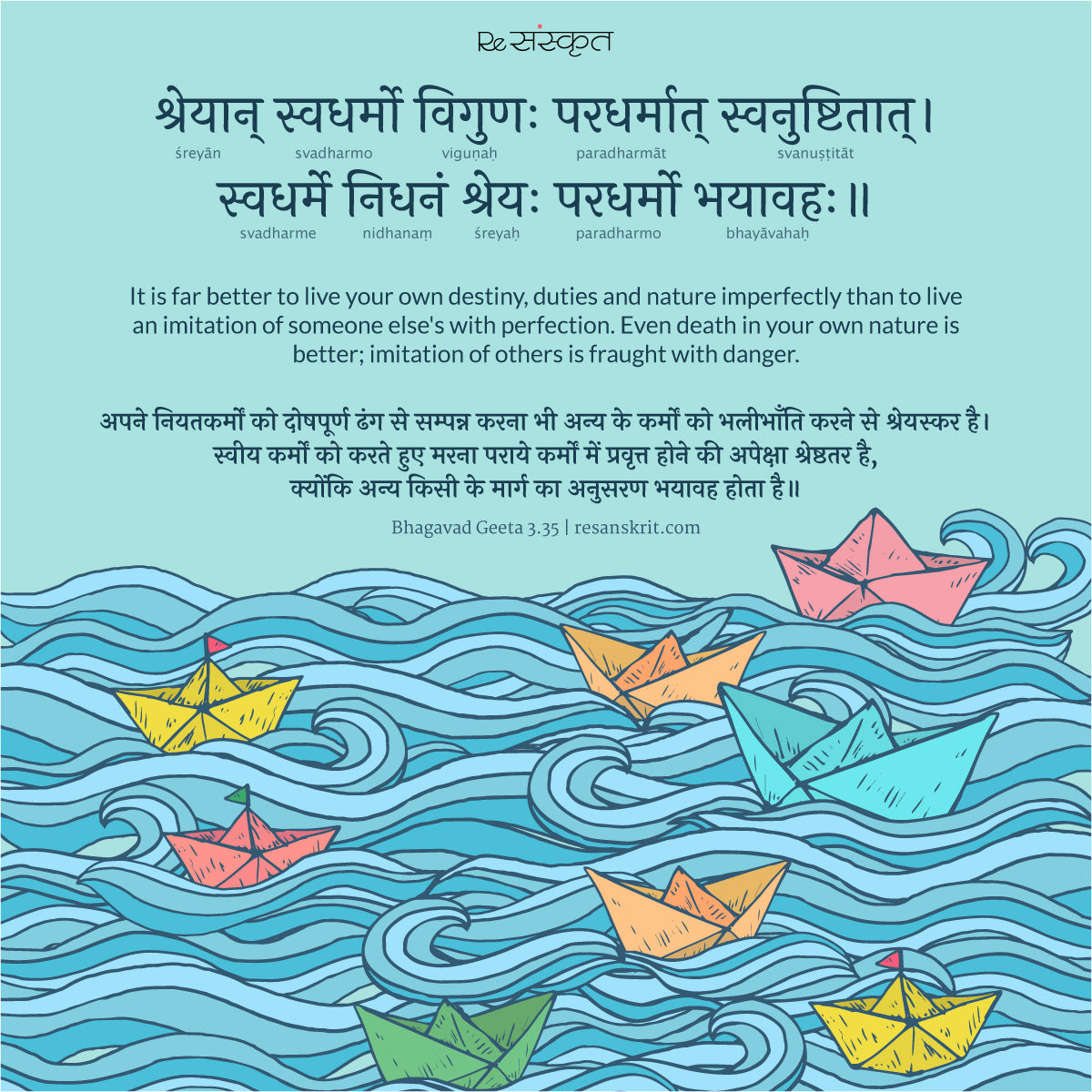
श्रेयान्स्वधर्मो विगुणः परधर्मात्स्वनुष्ठितात्।
स्वधर्मे निधनं श्रेयः परधर्मो
भयावहः॥ ३-३५
Transliteration:
śreyānsvadharmo viguṇaḥ
paradharmātsvanuṣṭhitāt।
svadharme nidhanaṃ śreyaḥ paradharmo bhayāvahaḥ॥ 3-35
Hindi Translation:
सम्यक् प्रकार से अनुष्ठित परधर्म की
अपेक्षा गुणरहित स्वधर्म का पालन श्रेयष्कर है स्वधर्म में मरण कल्याणकारक है किन्तु परधर्म भय को देने वाला है।
English Translation:
One’s own duty, though devoid of merit,
is preferable to the duty of another well performed.
Even death in the performance of one’s own duty brings
blessedness; another’s duty is fraught with fear.
Chapter 3, verse 42

इन्द्रियाणि पराण्याहुरिन्द्रियेभ्यः परं मनः।
मनसस्तु परा बुद्धिर्यो बुद्धेः परतस्तु
सः॥ ३-४२
Transliteration:
indriyāṇi parāṇyāhurindriyebhyaḥ paraṃ
manaḥ।
manasastu parā buddhiryo buddheḥ paratastu saḥ॥ 3-42
Hindi Translation:
शरीर से परे श्रेष्ठ इन्द्रियाँ कही जाती
हैं, इन्द्रियों से परे मन है और मन से परे बुद्धि है और जो बुद्धि से भी परे है वह है आत्मा।
English Translation:
The senses are superior to the gross
body, and superior to the senses is the mind.
Beyond the mind is the intellect, and even beyond the intellect
is the soul.
Chapter 4, verse 7
यदा यदा हि धर्मस्य ग्लानिर्भवति भारत।
अभ्युत्थानमधर्मस्य तदात्मानं सृजाम्यहम्॥ ४-७
Transliteration:
yadā yadā hi dharmasya glānir bhavati
bhārata।
abhyutthānam adharmasya tadātmānaṁ sṛjāmy aham॥ 4-7
Hindi Translation:
हे भरतवंशी, जब-जब जहाँ-जहाँ धर्म का ह्रास
होता है और अधर्म का प्रबल उदय होता है, तब-तब मैं अवतरित होता हूँ
English Translation:
Whenever and wherever there is a decline
in religious practice, O descendant of Bharata, and a predominant rise of irreligion – at that time I descend
Myself.
Chapter 4, verse 8
परित्राणाय साधुनां विनाशाय च दुष्कृताम्।
धर्मसंस्थानार्थाय सम्भवामि युगे युगे॥ ४-८
Transliteration:
paritrāṇāya sādhūnāṁ vināśāya ca
duṣkṛtām।
Dharma-saṁsthāpanārthāya sambhavāmi yuge yuge॥ 4-8
Hindi Translation:
धर्मपरायणों का उद्धार करने के लिए और
दुष्टों का विनाश करने के लिए, साथ ही साथ धर्म के सिद्धांतों को फिर से स्थापित करने के लिए, मैं स्वयं सहस्राब्दी
के बाद प्रकट होता हूँ।
English Translation:
To deliver the pious and to annihilate
the miscreants, as well as to reestablish the principles of religion, I Myself appear, millennium after
millennium.
Chapter 4, verse 9
जन्म कर्म च मे दिव्यमेवं यो वेत्ति तत्त्वतः।
त्यक्त्वा देहं पुनर्जन्म नैति मामेति सोऽर्जुन॥ ४-९
Transliteration:
janma karma ca me divyam evaṁ yo vetti
tattvataḥ।
tyaktvā dehaṁ punar janma naiti mām eti so ’rjun॥ 4-9
Hindi Translation:
जो मेरे प्रकटन और गतिविधियों की पारलौकिक
प्रकृति को जानता है, वह शरीर छोड़ने पर, इस भौतिक संसार में फिर से जन्म नहीं लेता, बल्कि हे अर्जुन, मेरे शाश्वत
निवास को प्राप्त करता है।
English Translation:
One who knows the transcendental nature
of My appearance and activities does not, upon leaving the body, take his birth again in this material world,
but attains My eternal abode, O Arjuna.
Chapter 4, verse 22
यदृच्छालाभसंतुष्टो द्वन्द्वातीतो विमत्सरः।
समः सिद्धावसिद्धौ च कृत्वापि न निबध्यते॥ ४-२२
Transliteration:
Yadṛcchā-lābha-santuṣṭo dvandvātīto
vimatsaraḥ।
samaḥ siddhāv asiddhau ca kṛtvāpi na nibadhyate॥ 4-22
Hindi Translation:
जो अपने आप होने वाले लाभ से संतुष्ट है, जो
द्वैत से मुक्त है और ईर्ष्या नहीं करता, जो सफलता और विफलता दोनों में स्थिर है, वह कर्म करते हुए भी कभी नहीं
बँधता।
English Translation:
He who is satisfied with gain which
comes of its own accord, who is free from duality and does not envy, who is steady in both success and failure,
is never entangled, although performing actions.
Chapter 4, verse 30
सर्वेऽप्येते यज्ञविदो यज्ञक्षपितकल्मषाः।
यज्ञशिष्टामृतभुजो यान्ति ब्रह्म सनातनम्॥ ४-३०
Transliteration:
sarve’py ete yajña-vido
yajña-kṣapita-kalmaṣāḥ।
Yajña-śiṣṭāmṛta-bhujo yānti brahma sanātanam॥ 4-30
Hindi Translation:
यज्ञ का अर्थ जानने वाले ये सभी कर्ता
पापकर्मों से मुक्त हो जाते हैं, और यज्ञों के फलों के अमृत को चखने के बाद, वे सर्वोच्च शाश्वत वातावरण की ओर बढ़ते
हैं।
English Translation:
All these performers who know the
meaning of sacrifice become cleansed of sinful reactions, and, having tasted the nectar of the results of
sacrifices, they advance toward the supreme eternal atmosphere.
Explanation:
The main aim of performing the sacrifices
explained in the Vedas is to have control over senses. The only cause of one’s existence in the material world
is Sense gratification. Hence, until and unless one takes control of his senses, he/she cannot be elevated to an
eternal platform of full knowledge, full bliss and full life.
Chapter 4, verse 42
तस्मादज्ञानसम्भूतं हृत्स्थं ज्ञानासिनात्मनः।
छित्त्वैनं संशयं योगमातिष्ठोत्तिष्ठ भारत॥ ४-४२
Transliteration:
tasmād ajñāna-sambhūtaṁ hṛt-sthaṁ
jñānāsinātmanaḥ।
chittvainaṁ saṁśayaṁ yogam ātiṣṭhottiṣṭha bhārata॥ 4-42
Hindi Translation:
इसलिए अज्ञान के कारण तुम्हारे हृदय में जो
संदेह उत्पन्न हो गए हैं, उन्हें ज्ञान के शस्त्र से काट देना चाहिए। योग से सुसज्जित, हे भारत, खड़े होकर युद्ध
करो।
English Translation:
Therefore the doubts which have arisen
in your heart out of ignorance should be slashed by the weapon of knowledge. Armed with yoga, O Bhārata, stand
and fight.
Explanation:
The Bhagavad Gita teaches us to overcome our
doubts and conquer our tasks, even when we feel that a situation is not in our control. This is a valuable
lesson for all generations.
Chapter 4, verse 34
तद्विद्धि प्रणिपातेन परिप्रश्नेन सेवया।
उपदेक्ष्यन्ति ते ज्ञानं ज्ञानिनस्तत्त्वदर्शिनः॥ ४-३४
Transliteration:
tad viddhi praṇipātena paripraśnena
sevayā।
upadekṣyanti te jñānaṁ jñāninas tattva-darśinaḥ॥ 4-34
Hindi Translation:
किसी आध्यात्मिक गुरु के पास जाकर सत्य को
जानने का प्रयास करें। उससे विनम्रतापूर्वक पूछें और उसकी सेवा करें। आत्मसाक्षात्कारी आत्माएँ आपको ज्ञान प्रदान कर
सकती हैं क्योंकि उन्होंने सत्य को देखा है।
English Translation:
Just try to learn the truth by
approaching a spiritual master. Inquire from him submissively and render service unto him. The self-realised
souls can impart knowledge unto you because they have seen the truth.
Bhagavad Gita - Chapter 5 – Karma Yog : The Yog of Action
Chapter 5, verse 3
ज्ञेय: स नित्यसन्न्यासी यो न द्वेष्टि न काङ्क्षति।
निर्द्वन्द्वो हि महाबाहो सुखं बन्धात्प्रमुच्यते॥
५-३
Transliteration:
jñeyaḥ sa nitya-sannyāsī yo na dveṣṭi na
kāṅkṣati।
nirdvandvo hi mahā-bāho sukhaṁ bandhāt pramucyate॥ 5-3
Hindi Translation:
जो न तो अपने कार्यों के फल से घृणा करता है
और न ही इच्छा करता है, वह हमेशा त्यागी माना जाता है। ऐसा व्यक्ति, सभी द्वंद्वों से मुक्त, आसानी से भौतिक बंधनों
को पार कर जाता है और पूरी तरह से मुक्त हो जाता है, हे शक्तिशाली-बाहु अर्जुन।
English Translation:
One who neither hates nor desires the
fruits of his activities is known to be always renounced. Such a person, free from all dualities, easily
overcomes material bondage and is completely liberated, O mighty-armed Arjuna.
Chapter 5, verse 7
योगयुक्तो विशुद्धात्मा विजितात्मा जितेन्द्रिय:।
सर्वभूतात्मभूतात्मा कुर्वन्नपि न लिप्यते॥ ५-७
Transliteration:
yoga-yukto viśuddhātmā vijitātmā
jitendriyaḥ।
Sarva-bhūtātma-bhūtātmā kurvann api na lipyate॥ 5-7
Hindi Translation:
जो भक्ति में कर्म करता है, जो पवित्र आत्मा
है, जो अपने मन और इन्द्रियों को वश में करता है, वह सबका प्रिय है और उसे सब प्रिय हैं। ऐसा व्यक्ति कर्म करते हुए
भी कभी नहीं बँधता।
English Translation:
One who works in devotion, who is a pure
soul, and who controls his mind and senses is dear to everyone, and everyone is dear to him. Though always
working, such a man is never entangled.
Chapter 5, verse 18
विद्याविनयसम्पन्ने ब्राह्मणे गवि हस्तिनि।
शुनि चैव श्वपाके च पण्डिता: समदर्शिन:॥ ५-१८
Transliteration:
Vidyā-vinaya-sampanne brāhmaṇe gavi
hastini।
śuni caiva śva-pāke ca paṇḍitāḥ sama-darśinaḥ॥ 5-18
Hindi Translation:
विनम्र संत, सच्चे ज्ञान के आधार पर, एक
विद्वान और सज्जन ब्राह्मण, एक गाय, एक हाथी, एक कुत्ता और एक कुत्ता-खाने वाले [बहिष्कृत] को समान दृष्टि से देखते
हैं।
English Translation:
The humble sages, by virtue of true
knowledge, see with equal vision a learned and gentle brāhmaṇa, a cow, an elephant, a dog and a dog-eater
[outcaste].
Chapter 5, verse 22
ये हि संस्पर्शजा भोगा दु:खयोनय एव ते।
आद्यन्तवन्त: कौन्तेय न तेषु रमते बुध:॥ ५-२२
Transliteration:
ye hi saṁsparśa-jā bhogā duḥkha-yonaya eva
te।
ādy-antavantaḥ kaunteya na teṣu ramate budhaḥ॥ 5-22
Hindi Translation:
एक बुद्धिमान व्यक्ति दुख के स्रोतों में
भाग नहीं लेता है, जो भौतिक इंद्रियों के संपर्क के कारण होते हैं। हे कुंती के पुत्र, ऐसे सुखों का आदि और अंत होता
है, और इसलिए बुद्धिमान व्यक्ति उनसे प्रसन्न नहीं होता।
English Translation:
An intelligent person does not take part
in the sources of misery, which are due to contact with the material senses. O son of Kuntī, such pleasures have
a beginning and an end, and so the wise man does not delight in them.
Chapter 5, verse 24
योऽन्त:सुखोऽन्तरारामस्तथान्तर्ज्योतिरेव य:।
स योगी ब्रह्मनिर्वाणं ब्रह्मभूतोऽधिगच्छति॥ ५-२४
Transliteration:
yo ’ntaḥ-sukho ’ntar-ārāmas
tathāntar-jyotir eva yaḥ।
sa yogī brahma-nirvāṇaṁ brahma-bhūto ’dhigacchati॥ 5-24
Hindi Translation:
जिसका आनंद भीतर है, जो सक्रिय है और भीतर
आनंदित है, और जिसका लक्ष्य भीतर है, वह वास्तव में पूर्ण रहस्यवादी है। वह परम में मुक्त हो जाता है, और अंततः वह
परम को प्राप्त करता है।
English Translation:
One whose happiness is within, who is
active and rejoices within, and whose aim is inward is actually the perfect mystic. He is liberated in the
Supreme, and ultimately he attains the Supreme.
Chapter 5, verse 25
लभन्ते ब्रह्मनिर्वाणमृषय: क्षीणकल्मषा:।
छिन्नद्वैधा यतात्मान: सर्वभूतहिते रता:॥ ५-२५
Transliteration:
labhante brahma-nirvāṇam ṛṣayaḥ
kṣīṇa-kalmaṣāḥ।
chinna-dvaidhā yatātmānaḥ sarva-bhūta-hite ratāḥ॥ 5-25
Hindi Translation:
जो संदेहों से उत्पन्न होने वाले द्वंद्वों
से परे हैं, जिनके मन भीतर लगे हुए हैं, जो हमेशा सभी जीवों के कल्याण के लिए काम में लगे रहते हैं और जो सभी पापों
से मुक्त हैं, वे परम में मुक्ति प्राप्त करते हैं।
English Translation:
Those who are beyond the dualities that
arise from doubts, whose minds are engaged within, who are always busy working for the welfare of all living
beings and who are free from all sins achieve liberation in the Supreme.
Chapter 5, verse 26
कामक्रोधविमुक्तानां यतीनां यतचेतसाम्।
अभितो ब्रह्मनिर्वाणं वर्तते विदितात्मनाम्॥ ५-२६
Transliteration:
Kāma-krodha-vimuktānāṁ yatīnāṁ
yata-cetasām।
abhito brahma-nirvāṇaṁ vartate viditātmanām॥ 5-26
Hindi Translation:
जो लोग क्रोध और सभी भौतिक इच्छाओं से मुक्त
हैं, जो आत्म-साक्षात्कारी, आत्म-अनुशासित हैं और पूर्णता के लिए निरंतर प्रयास कर रहे हैं, वे निकट भविष्य में परम
में मुक्ति के लिए निश्चित हैं।
English Translation:
Those who are free from anger and all
material desires, who are self-realised, self-disciplined and constantly endeavouring for perfection, are
assured of liberation in the Supreme in the very near future.
Bhagavad Gita - Chapter 6
Chapter 6, verse 1
अनाश्रित: कर्मफलं कार्यं कर्म करोति य:।
स सन्न्यासी च योगी च न निरग्निर्न चाक्रिय:॥ ६-१
Transliteration:
anāśritaḥ karma-phalaṁ kāryaṁ karma karoti
yaḥ।
sa sannyāsī ca yogī ca na niragnir na cākriyaḥ॥ 6-1
Hindi Translation:
भगवान ने कहा: वह जो अपने कर्म के फल के
प्रति अनासक्त है और जो अपने कर्तव्य के अनुसार कार्य करता है वह जीवन के संन्यासी क्रम में है, और वह सच्चा
रहस्यवादी है, न कि वह जो कोई आग नहीं जलाता है और कोई कर्तव्य नहीं करता है।
English Translation:
Shri Krishna said: One who is unattached
to the fruits of his work and who works as he is obligated is in the renounced order of life, and he is the true
mystic, not he who lights no fire and performs no duty.
Chapter 6, verse 4
यदा हि नेन्द्रियार्थेषु न कर्मस्वनुषज्जते।
सर्वसङ्कल्पसन्न्यासी योगारूढस्तदोच्यते॥ ६-४
Transliteration:
yadā hi nendriyārtheṣu na karmasv
anuṣajjate।
Sarva-saṅkalpa-sannyāsī yogārūḍhas tadocyate॥ 6-4
Hindi Translation:
एक व्यक्ति को योग में उन्नत कहा जाता है,
जब सभी भौतिक इच्छाओं को त्याग कर, वह न तो इन्द्रियतृप्ति के लिए कार्य करता है और न ही सकारात्मक गतिविधियों में
संलग्न होता है।
English Translation:
A person is said to be elevated in yoga
when, having renounced all material desires, he neither acts for sense gratification nor engages in fruitive
activities.
Bhagavad Gita Chapter 6, verse 5
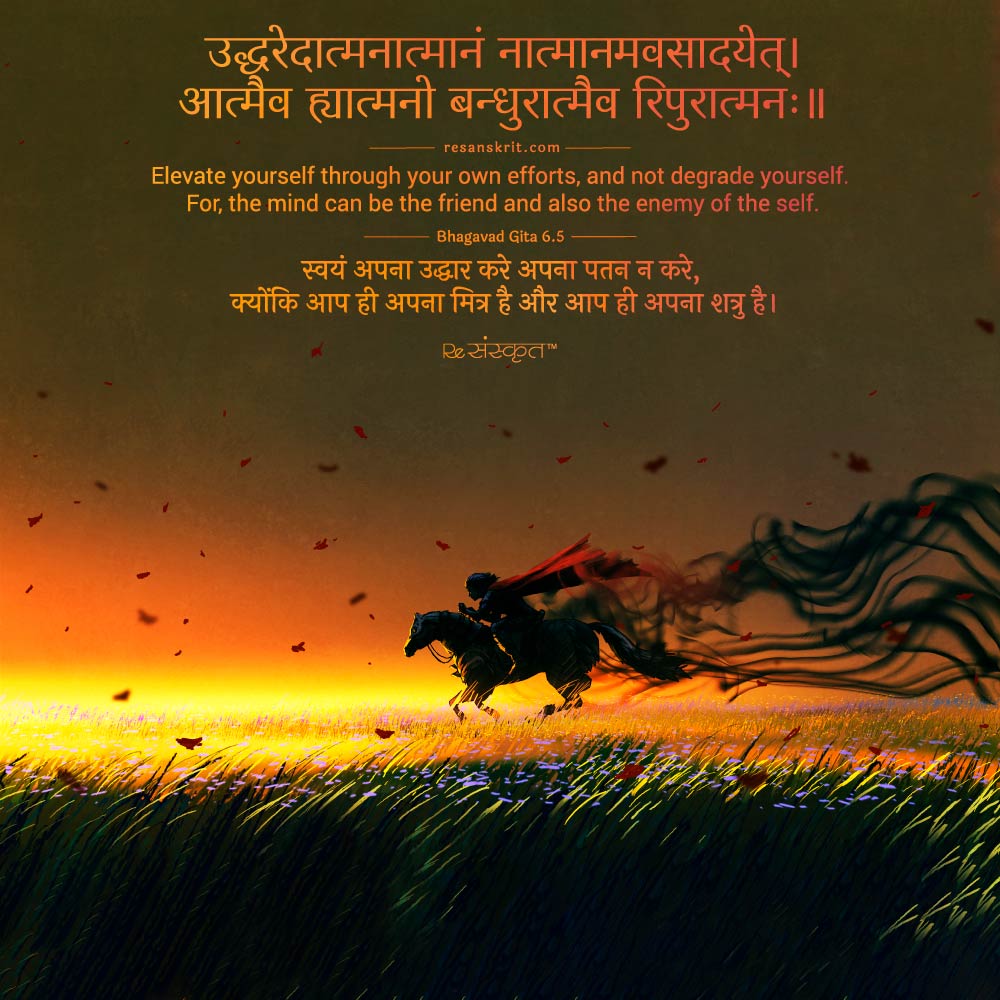
उद्धरेदात्मनात्मानं नात्मानमवसादयेत्।
आत्मैव ह्यात्मनो बन्धुरात्मैव रिपुरात्मनः॥
Transliteration:
uddharedātmanātmānaṃ
nātmānamavasādayet।
ātmaiva hyātmano bandhurātmaiva ripurātmanaḥ॥
Hindi Translation:
स्वयं अपना उद्धार करे अपना पतन न
करे,
क्योंकि आप ही अपना मित्र है और आप ही अपना शत्रु है।
English Translation:
Elevate yourself through your own
efforts, and not degrade yourself. For, the mind can be the friend and also the enemy of the self.
Chapter 6, verse 6
बन्धुरात्मात्मनस्तस्य येनात्मैवात्मना जित:।
अनात्मनस्तु शत्रुत्वे वर्तेतात्मैव शत्रुवत्॥ ६-६
Transliteration:
bandhur ātmātmanas tasya yenātmaivātmanā
jitaḥ।
anātmanas tu śatrutve vartetātmaiva śatru-vat॥ 6-6
Hindi Translation:
जिसने मन को जीत लिया है, उसके लिए मन सबसे
अच्छा मित्र है; लेकिन जो ऐसा करने में असफल रहा है, उसके लिए उसका मन सबसे बड़ा शत्रु बना रहेगा।
English Translation:
For him who has conquered the mind, the
mind is the best of friends; but for one who has failed to do so, his mind will remain the greatest enemy.
Bhagavad Gita Chapter 6, verse 17
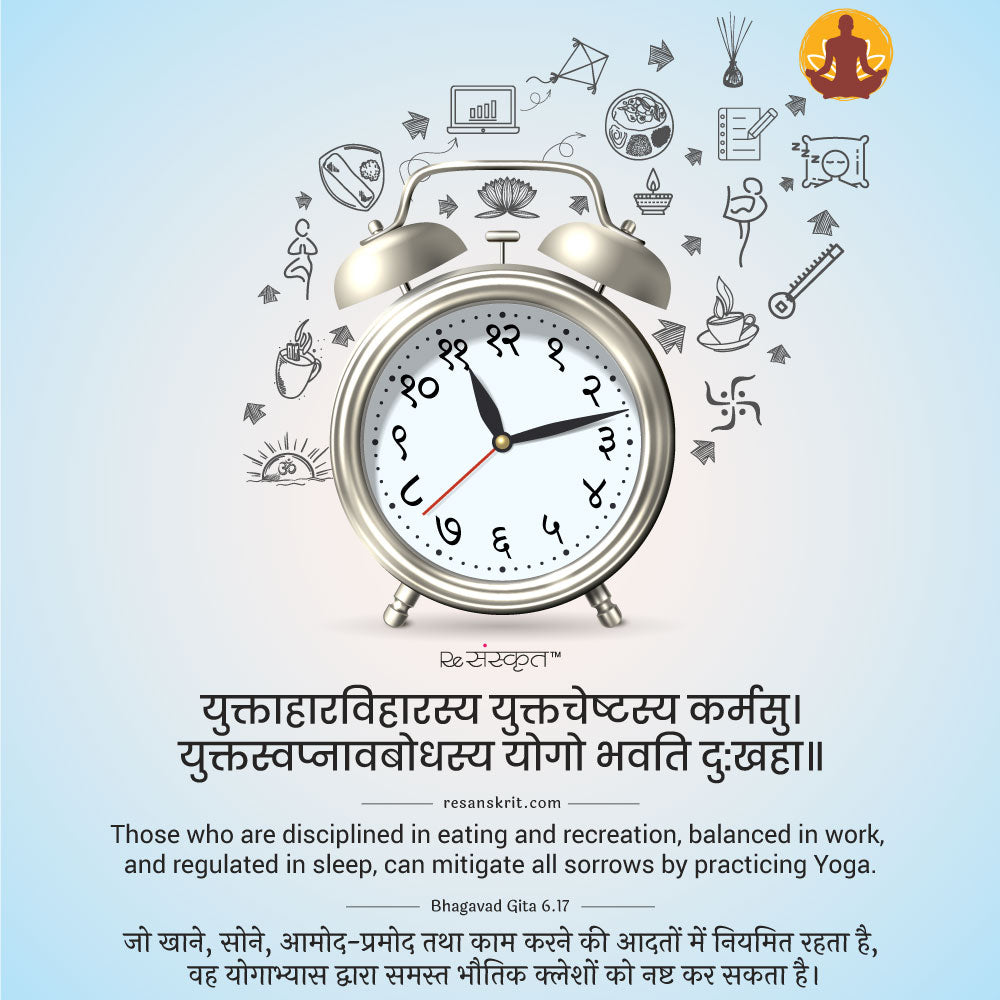
युक्ताहारविहारस्य युक्तचेष्टस्य कर्मसु।
युक्तस्वप्नावबोधस्य योगो भवति दु:खहा॥
Transliteration:
yuktāhāravihārasya yuktaceṣṭasya
karmasu।
yuktasvapnāvabodhasya yogo bhavati du:khahā॥
Hindi Translation:
जो खाने, सोने, आमोद-प्रमोद तथा काम करने की
आदतों में नियमित रहता है,
वह योगाभ्यास द्वारा समस्त भौतिक क्लेशों को नष्ट कर सकता है।
English Translation:
Those who are disciplined in eating and
recreation, balanced in work, and regulated in sleep, can mitigate all sorrows by practicing Yoga.
Chapter 6, verse 35
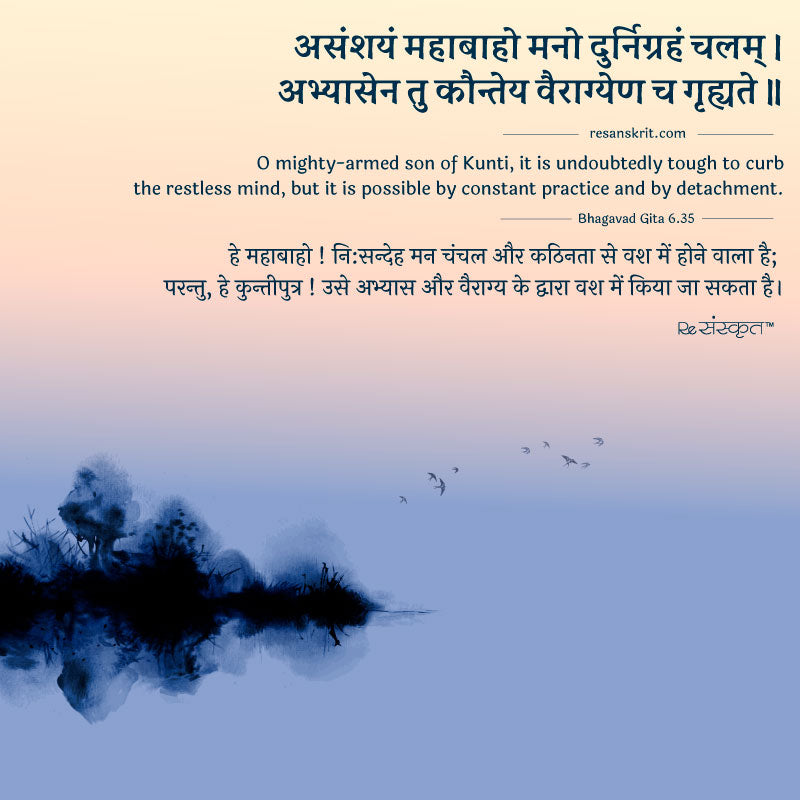
असंशयं महाबाहो मनो दुर्निग्रहं चलम् ।
अभ्यासेन तु कौन्तेय वैराग्येण च गृह्यते ॥
Transliteration:
asaṃśayaṃ mahābāho mano durnigrahaṃ calam
।
abhyāsena tu kaunteya vairāgyeṇa ca gṛhyate ॥
Hindi Translation:
हे महाबाहो ! नि:सन्देह मन चंचल और कठिनता
से वश में होने वाला है;
परन्तु, हे कुन्तीपुत्र ! उसे अभ्यास और वैराग्य के द्वारा वश में किया जा सकता है।
English Translation:
O mighty-armed son of Kunti, it is
undoubtedly tough to curb the restless mind, but it is possible by constant practice and by detachment.
Chapter 6, verse 40
पार्थ नैवेह नामुत्र विनाशस्तस्य विद्यते।
न हि कल्याणकृत्कश्चिद्दुर्गतिं तात गच्छति॥ ६-४०
Transliteration:
pārtha naiveha nāmutra vināśas tasya
vidyate।
na hi kalyāṇa-kṛt kaścid durgatiṁ tāta gacchati॥ 6-40
Hindi Translation:
भगवान ने कहा: पृथा का पुत्र, शुभ कार्यों
में लगा हुआ एक दिव्यवादी न तो इस दुनिया में और न ही आध्यात्मिक दुनिया में विनाश के साथ मिलता है; हे मेरे मित्र,
जो भलाई करता है, वह बुराई से कभी हार नहीं मानता।
English Translation:
Shri Krishna said: Son of Pṛthā, a
transcendentalist engaged in auspicious activities does not meet with destruction either in this world or in the
spiritual world; one who does good, My friend, is never overcome by evil.
Chapter 6, verse 45
प्रयत्नाद्यतमानस्तु योगी संशुद्धकिल्बिष:।
अनेकजन्मसंसिद्धस्ततो याति परां गतिम्॥ ६-४५
Transliteration:
prayatnād yatamānas tu yogī
saṁśuddha-kilbiṣaḥ।
Aneka-janma-saṁsiddhas tato yāti parāṁ gatim॥ 6-45
Hindi Translation:
और जब योगी सभी कल्मषों से मुक्त होकर, आगे
की प्रगति करने के लिए सच्चे प्रयास में लग जाता है, तो अंतत: कई, कई जन्मों के अभ्यास के बाद, वह परम लक्ष्य को
प्राप्त कर लेता है।
English Translation:
And when the yogī engages himself with
sincere endeavour in making further progress, being washed of all contaminations, then ultimately, achieving
perfection after many, many births of practice, he attains the supreme goal.
Chapter 6, verse 47
योगिनामपि सर्वेषां मद्गतेनान्तरात्मना।
श्रद्धावान्भजते यो मां स मे युक्ततमो मत:॥ ६-४७
Transliteration:
yoginām api sarveṣāṁ
mad-gatenāntar-ātmanā।
śraddhāvān bhajate yo māṁ sa me yukta-tamo mataḥ॥ 6-47
Hindi Translation:
और सभी योगियों में, जो महान आस्था के सा
हमेशा मुझमें रहता है, अपने भीतर मेरे बारे में सोचता है और मुझे पारलौकिक प्रेमपूर्ण सेवा प्रदान करता है - वह योग
में मेरे साथ सबसे घनिष्ठ रूप से जुड़ा हुआ है और सबसे ऊंचा है। यह मेरी राय है।
English Translation:
And of all yogīs, the one with great
faith who always abides in Me, thinks of Me within himself and renders transcendental loving service to Me – he
is the most intimately united with Me in yoga and is the highest of all. That is My opinion.
Bhagavad Gita Quote mentioned by J. R. Oppenheimer
Bhagavad Gita Chapter 11, verse 32
The movie Oppenheimer is here and there is a lot of buzz around this Bhagavad Gita quote, quoted by J. Robert
Oppenheimer in one of his interviews after the Hiroshima and Nagasaki bombings. Oppenheimer was the architect of
Atomic bombs developed by the US.
The context of this verse is -
Arjun had asked Krishna to show him his
universal form. When Krishna showed him, Arjun was overwhelmed by the sight. He saw countless universes and all the
beings within them. He was filled with awe and wonder but also fear, and confusion. Arjun did not feel like
fighting.
That’s when Shree Krishna tells him that he is the mighty Time, and Time destroys everything and
everyone. Arise, Arjun, and fight! These warriors are already slain by me. You are simply an instrument of my
will.
Similarly, Oppenheimer was perplexed when he realised the true potential of what he had created. And
he advocated for placing a ban on nuclear weapons. Using Bhagavad Gita's teachings on the cyclical nature of
creation and destruction, Oppenheimer sought solace and consolation after the tragedy.

श्रीभगवानुवाच - कालोऽस्मि लोकक्षयकृत्प्रवृद्धो लोकान्समाहर्तुमिह प्रवृत्त:।
ऋतेऽपि त्वां न
भविष्यन्ति सर्वे येऽवस्थिता: प्रत्यनीकेषु योधा:॥
Transliteration:
śrībhagavānuvāca kālo'smi
lokakṣayakṛtpravṛddho lokānsamāhartumiha pravṛtta:।
ṛte'pi tvāṃ na bhaviṣyanti sarve ye'vasthitā:
pratyanīkeṣu yodhā:॥
Hindi Translation:
परम प्रभु ने कहा - “मैं प्रलय का मूलकारण
और महाकाल हूँ जो जगत का संहार करने के लिए आता है। तुम्हारे युद्ध में भाग लेने के बिना भी युद्ध की व्यूह रचना में
खड़े विरोधी पक्ष के योद्धा मारे जाएंगे।"
English Translation:
The Supreme Lord said: I am mighty Time,
the source of destruction that comes forth to annihilate the worlds. Even without your participation, the
warriors arrayed in the opposing army shall cease to exist.
Bhagavad Gita Quote on Sattva, Rajas and Tamas
Bhagavad Gita Chapter 14, verse 09
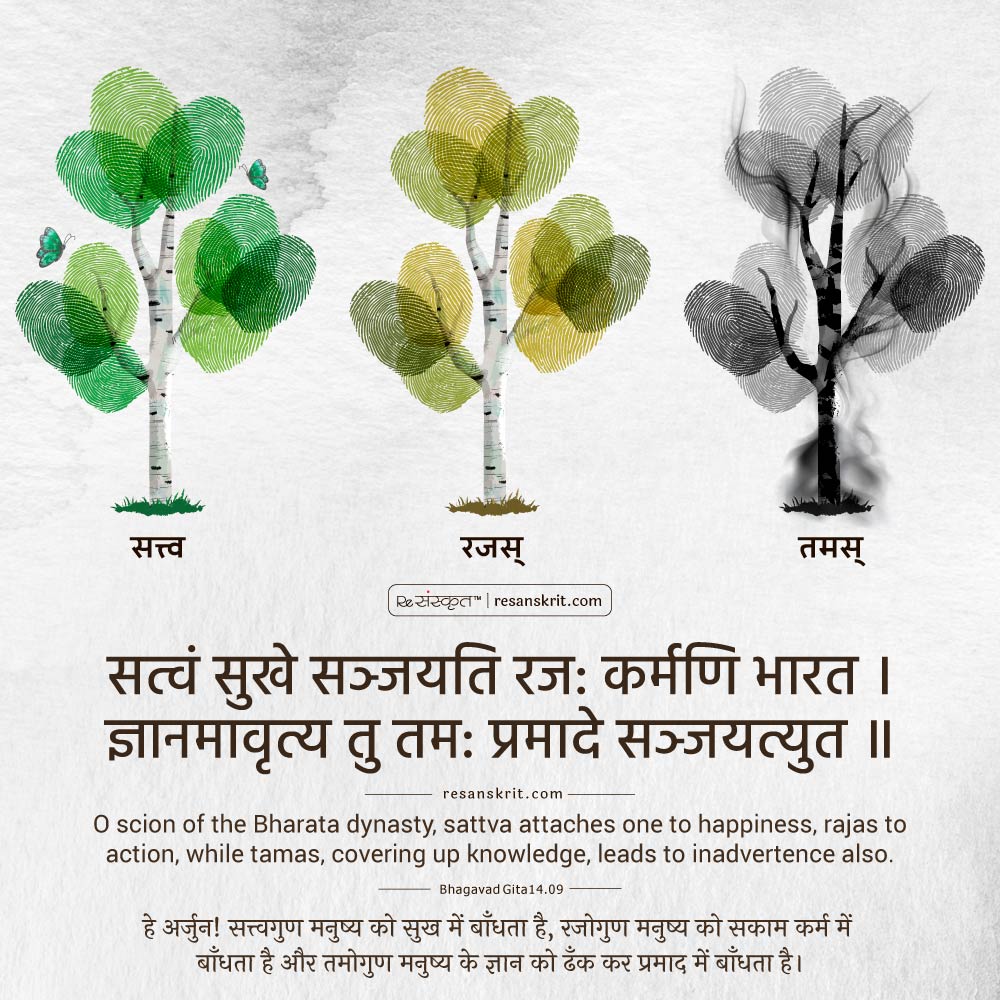
सत्वं सुखे सञ्जयति रज: कर्मणि भारत।
ज्ञानमावृत्य तु तम: प्रमादे सञ्जयत्युत॥
Transliteration:
satvaṃ sukhe sañjayati raja: karmaṇi
bhārata।
jñānamāvṛtya tu tama: pramāde sañjayatyuta॥
Hindi Translation:
हे अर्जुन! सत्त्वगुण मनुष्य को सुख में
बाँधता है, रजोगुण मनुष्य को सकाम कर्म में बाँधता है,
और तमोगुण मनुष्य के ज्ञान को ढँक कर प्रमाद में बाँधता
है।
English Translation:
O scion of the Bharata dynasty, sattva
attaches one to happiness, rajas to action,
while tamas, covering up knowledge, leads to inadvertence also.
Bhagavad Gita Quote on Anger, Greed and Lust
Bhagavad Gita Chapter 16, verse 21

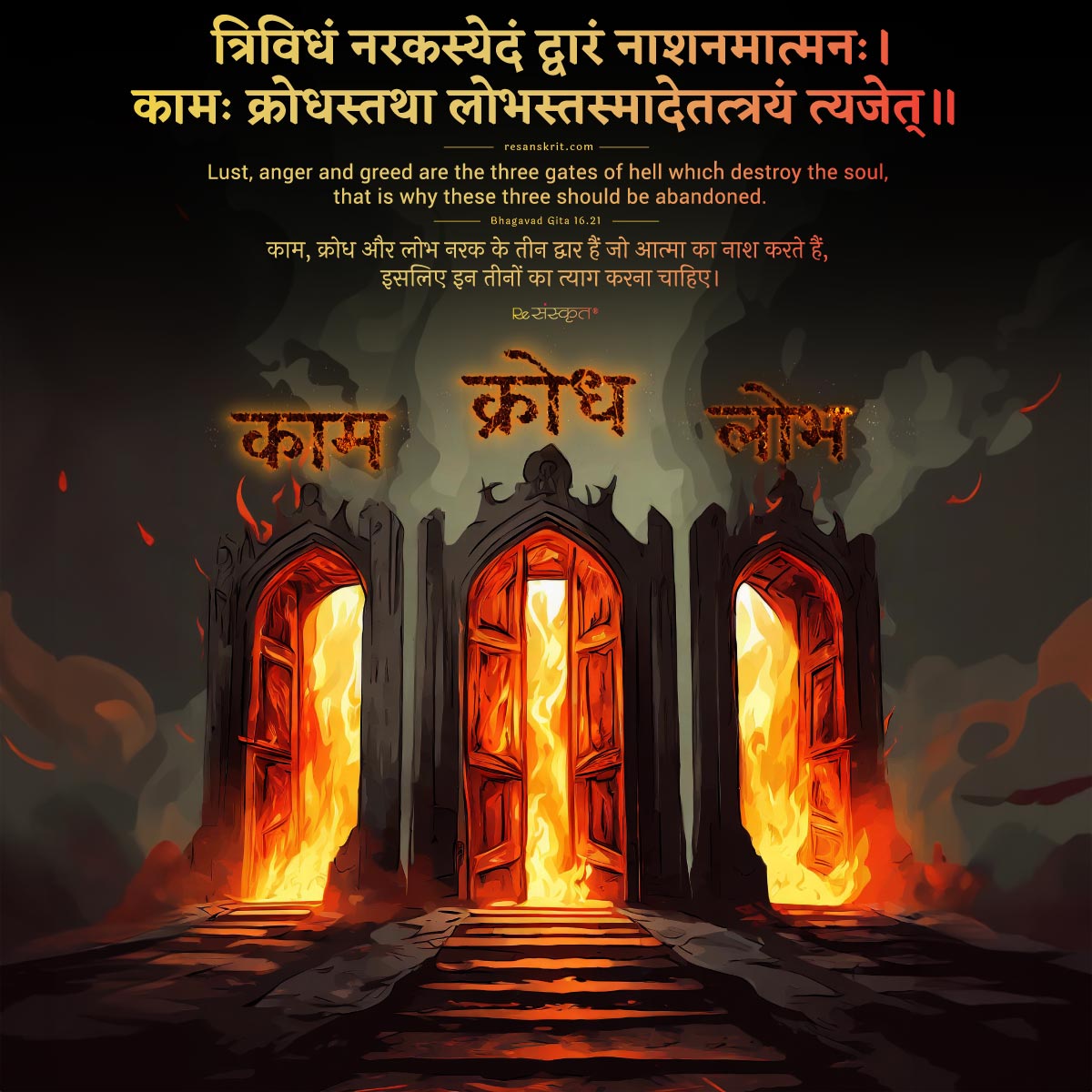
त्रिविधं नरकस्येदं द्वारं नाशनमात्मनः।
कामः क्रोधस्तथा लोभस्तस्मादेतत्त्रयं त्यजेत्॥
Transliteration:
satvaṃ sukhe sañjayati raja: karmaṇi
bhārata।
jñānamāvṛtya tu tama: pramāde sañjayatyuta॥
Hindi Translation:
काम, क्रोध और लोभ, ये आत्मविनाश के नरक के
तीन द्वार हैं।
अतः इन तीनों का त्याग करना चाहिए।
English Translation:
Lust, anger and greed, these are the
three doors to self-destructive hell.
Thus, one should avoid these.
Bhagavad Gita Quote on Donation
Bhagavad Gita Chapter 17, verse 20
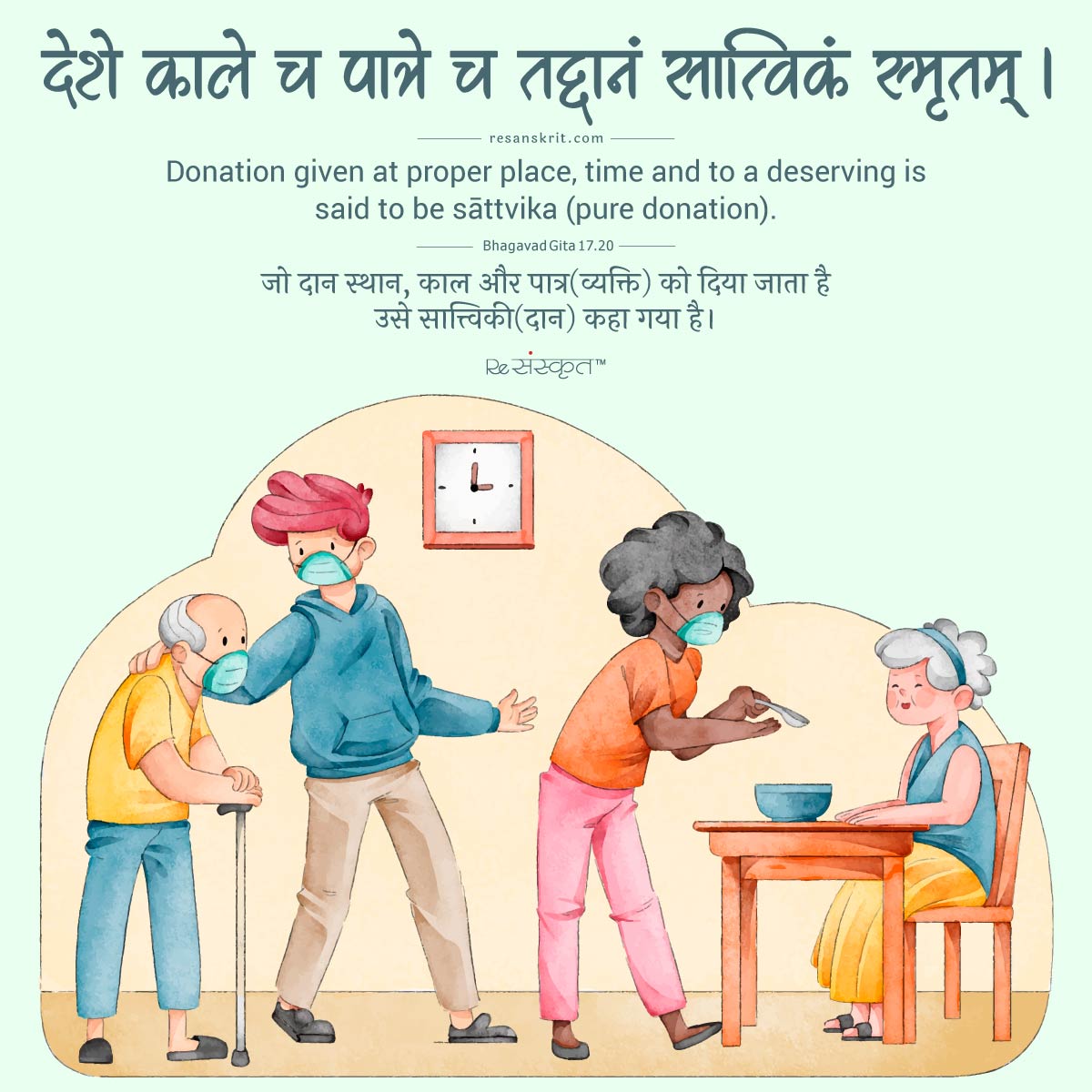
दातव्यमिति यद्दानं दीयतेऽनुपकारिणे।
देशे काले च पात्रे च तद्दानं सात्त्विकं स्मृतम्॥
Transliteration:
dātavyam iti yad dānaṁ dīyate
nupakāriṇe
deśhe kāle cha pātre cha tad dānaṁ sāttvikaṁ smṛitam
Hindi Translation:
दान देना ही कर्तव्य है इस भाव से जो दान
योग्य देश,
काल को देखकर ऐसे (योग्य) पात्र (व्यक्ति) को दिया जाता है,
जिससे प्रत्युपकार की अपेक्षा नहीं
होती है? वह दान सात्त्विक माना गया है।
English Translation:
Charity given to a worthy person simply
because it is right to give,
without consideration of anything in return, at the proper time and in the
proper place,
is stated to be in the mode of goodness.
Bhagavad Gita Quote on Actions
Bhagavad Gita Chapter 18, verse 11
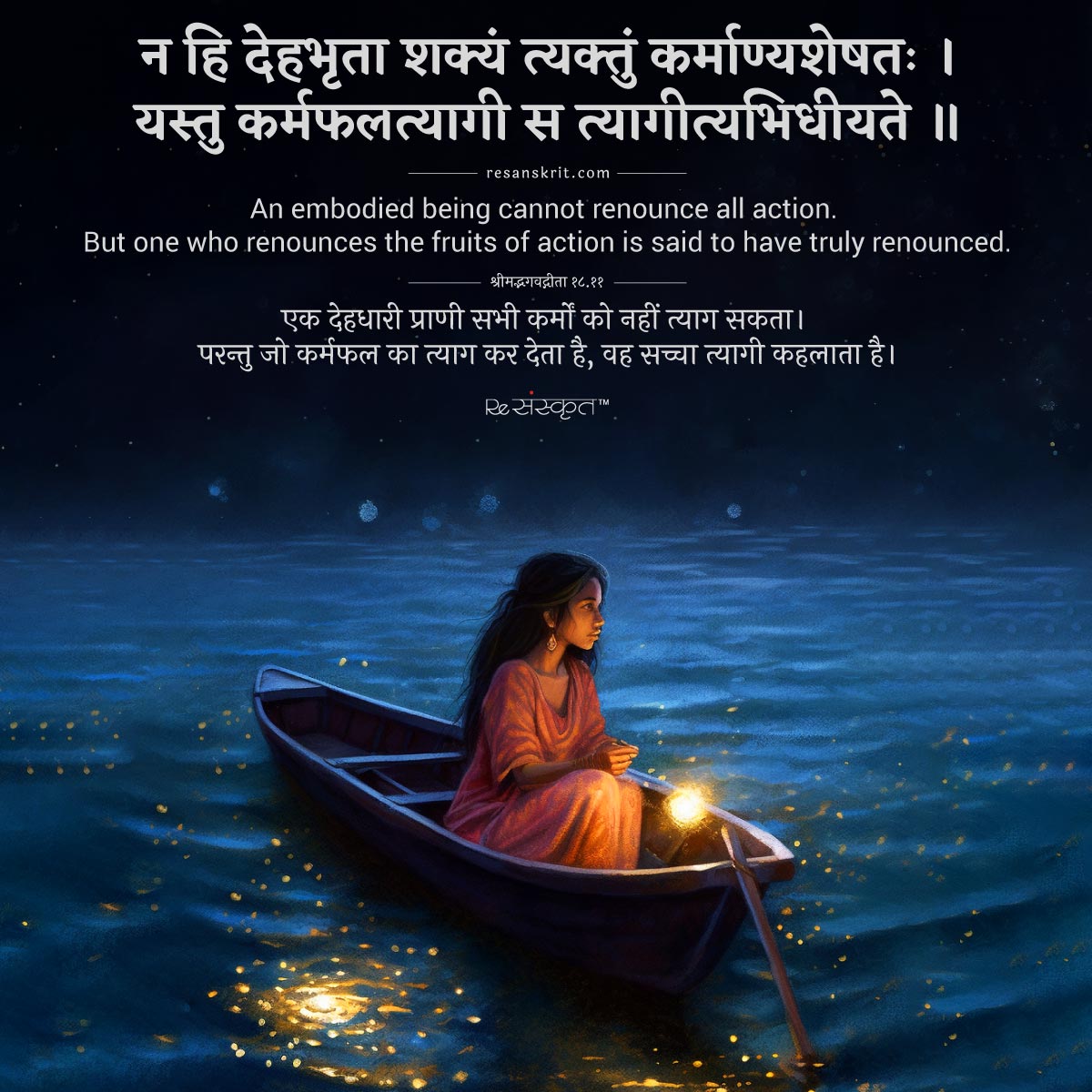
न हि देहभृता शक्यं त्यक्तुं कर्माण्यशेषतः।
यस्तु कर्मफलत्यागी स त्यागीत्यभिधीयते॥
Transliteration:
na hi dehabhṛtā śakyaṃ tyaktuṃ
karmāṇyaśeṣataḥ।
yastu karmaphalatyāgī sa tyāgītyabhidhīyate॥
Hindi Translation:
एक देहधारी प्राणी सभी कर्मों को नहीं त्याग
सकता।
परन्तु जो कर्मफल का त्याग कर देता है, वह सच्चा त्यागी कहलाता है।
English Translation:
An embodied being cannot renounce all
action.
But one who renounces the fruits of action is said to have truly renounced.





![[New Edition] ReSanskrit® 365 Days of Sanskrit Wisdom | Daily Sanskrit Quotes | With 100+ New Quotes, Hindi & English Translations🆕](http://resanskrit.myshopify.com/cdn/shop/files/365-calendar-resanskrit-front-hero-shot_533x.jpg?v=1762351171)
![[New Edition] ReSanskrit® 365 Days of Sanskrit Wisdom | Daily Sanskrit Quotes | With 100+ New Quotes, Hindi & English Translations🆕](http://resanskrit.myshopify.com/cdn/shop/files/365-calendar-resanskrit-quote-shot1_533x.jpg?v=1762351193)



![[Part 2] Relevant Sanskrit Shlokas with Meaning in Hindi & English](http://resanskrit.myshopify.com/cdn/shop/articles/Relevant-Sanskrit-Shlokas-Article-Cover-image-part-2_313c9dad-1602-485b-9c65-75318291d931_165x.jpg?v=1768923830)


19 Comments
I enjoyed your collection🙏🏿🙏🏿
Quite Enlightening Information for those seekers of divine beauty. Appreciate the great efforts made on this. Please enrich with more information
Wonderful collection & presentation of Bhagwat Gita SAAR .God bless you . share more if you have . regards .
Sir, I purchase this Geeta bhagwat, rate and address
Was waiting for chapter 4 but nevertheless, the collection is very nice.
Leave a comment
Please note, comments need to be approved before they are published.